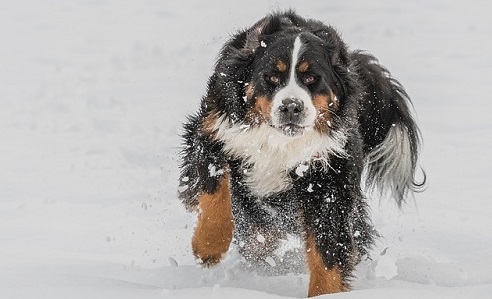If you’re looking to bring home a Bernese Mountain Dog, you should first get familiar with some of the health conditions this large breed has a history of developing. While these lovable, beautiful dogs do make great family pets, they unfortunately have a high risk for many health issues, and do not have a very long lifespan on average.
Let’s take a look at some of the Bernese Mountain Dog health issues that the breed is known to encounter.
Cancer
Around 10 percent of Bernese Mountain Dogs develop canine cancer at some point in their lifetime, typically affecting middle-aged and older dogs, however this can vary widely. Some forms of cancer in Bernese Mountain Dogs have a genetic link, such as histiocytosis and mastocytoma, while other common cancers, such as lymphosarcoma and fibrosarcoma, have no genetic link.
Bernese Mountain Dogs are also known to develop canine osteosarcoma, but tests are ongoing to determine if there is a genetic link. There is a tumor registry established by the Bernese Mountain Dog Club to collect and analyze tissue samples from affected dogs to try and find a cure, however the work is ongoing. Currently, most forms of cancer in Bernese Mountain Dogs will eventually prove to be fatal.
Hip Dysplasia
 Hip dysplasia in dogs is an abnormal development of an animal’s hips during their growth, which is common in large breed dogs like the Bernese. The condition causes their hip joints to loosen, which will flatten the head of their femur bone and cause the socket of the bone to become shallow. This will eventually lead to canine arthritis in the affected joint, but it may not appear physically for years.
Hip dysplasia in dogs is an abnormal development of an animal’s hips during their growth, which is common in large breed dogs like the Bernese. The condition causes their hip joints to loosen, which will flatten the head of their femur bone and cause the socket of the bone to become shallow. This will eventually lead to canine arthritis in the affected joint, but it may not appear physically for years.
The common signs of a dog with hip dysplasia include lameness, being slow to rise to their feet, and appearing stiff after they get up. They also may show signs of pain if the affected joint is touched or overworked. The condition is hereditary in Bernese Mountain Dogs.
Elbow Dysplasia
Large breed dogs like the Bernese are also prone to developing canine elbow dysplasia in addition to hip. This form occurs when two bones in the animal’s elbow do not unite when they are growing. The bones will rub together abnormally and lead to arthritis, just as it does with hip dysplasia, and is also genetic.
Progressive Retinal Atrophy
Progressive Retinal Atrophy in dogs, or PRA, is an inherited eye disease that will often lead to canine blindness. The condition has only recently appeared in the Bernese Mountain Dog, becoming more prominent within the past twenty years. Early forms of PRA can be detected as early as three months old and can also be late onset in dogs at or above five years old. Either way, PRA can lead to vision loss in dogs.
The signs of PRA include night blindness, dilated pupils, appearing to be disoriented in strange environments, and a reluctance to explore new places. If a Bernese Mountain Dog is diagnosed with PRA, he will typically be blind within a year. Make sure your Bernese has annual eye exams, and if you get your dog from a breeder, check for certificates to prove that their parents were healthy as well.
Von Willebrand’s Disease
A bleeding disorder that is seen in many different breeds of dog, von Willebrand’s Disease (vWD) is an autosomal recessive trait in Bernese Mountain Dogs that restricts blood from clotting normally. Because of this trait, there is a genetic test for the breed to see if they have vWD. This will be important information to have before your Bernese has surgery, as this is when most issues arise from having this disease.
Other Bernese Mountain Dog Health Problems
 There are other fairly common health problems that have been seen in the Bernese Mountain Dog as well. These may include:
There are other fairly common health problems that have been seen in the Bernese Mountain Dog as well. These may include:
- Bloat
- Gastric torsion
- Inflammatory bowel disease
- Food allergies
- Skin allergies
- Kidney disease
- Myasthenia gravis
- Hypothyroidism
- Epilepsy
- Heart disease
- Heat sensitivity
These are health problems that have affected a good percentage of Bernese Mountain Dogs, but are not seen as often as the first four listed.
Lifespan
The Bernese Mountain Dog has an average lifespan of six to nine years. Many of these big, lovable animals are lost early due to the hereditary cancers listed above or other health conditions. However, dogs that come from reputable breeders may have a better chance of living longer, healthier lives.
Owners should be prepared for the financial responsibilities that come along with caring for a Bernese Mountain Dog. They also must be sensitive to the dog’s long coat, and not work it too hard outside during the summer months. While many conditions are inherited, the best thing to do is to make sure your dog comes from a breeder with certificates that prove the parents were tested and cleared of hereditary eye diseases, von Willebrand’s disease, heart disease, and hip and elbow dysplasia.




